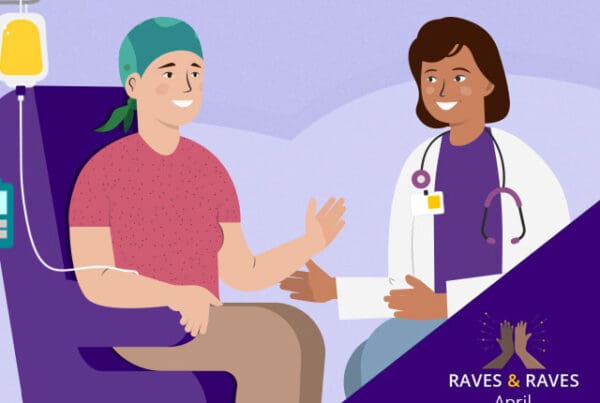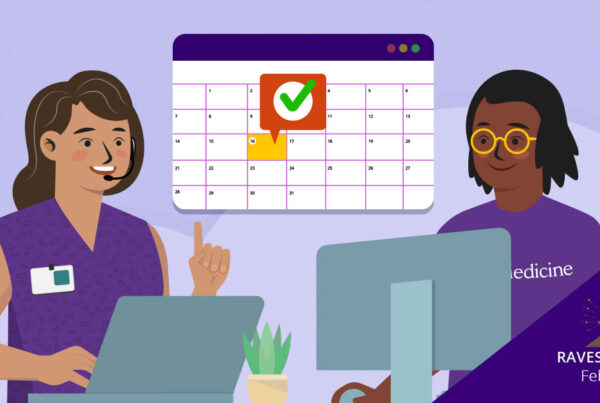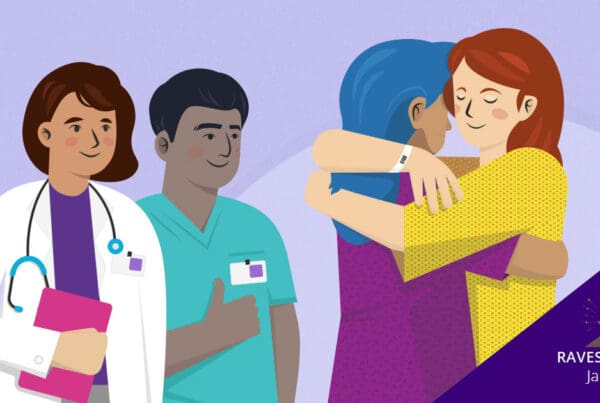In 1959, the inpatient rehabilitation medicine unit at University Hospital, now UW Medical Center – Montlake, opened. The nurses hired to work on 8N didn’t know it, but they were about to build life-long friendships and create a network of rehabilitation nurses that would support each other through the ups and downs of life and clinical care for the next 63 years and beyond.
Liz Brock, RN, CMSRN, was just (as she puts it) a “baby nurse” when she started on 8N of the rehabilitation unit in 1990. She was the youngest of the nurses working on that floor, many of whom had been there since the unit opened, and Brock was one of the last to join the network of nurses that had kept in touch since the unit’s inception.
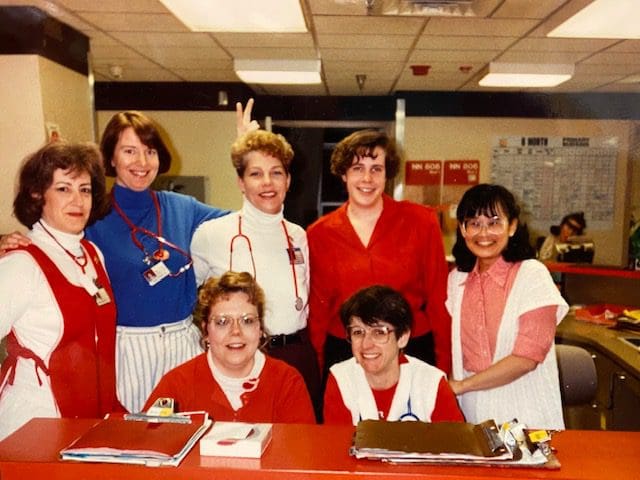
8N nurses
“This group of nurses, the ‘old-timers,’ had been together for a long time. One of the oldest members is in their 80s and retired the first year I started,” says Brock.
This network of now mostly retired nurses is a tight-knit group bonded by the opening of the unit and a bygone style of rehabilitation nursing.
A changing rehabilitation nursing landscape
When Brock started her nursing career, she was barely 21, and she learned the fundamentals of rehabilitation nursing during a time when the length of inpatient stay was months compared to days or weeks.
“When I first started, we had a 30-bed unit, a waiting list and the length of stay for patients was much longer, around four to six months,” she says. “We did primary nursing, so we were always working with the same patients on a daily basis and got really close with our patients and their families.”
Most patients she saw back then had more straightforward cases — patients would have a spinal cord injury, an amputation or traumatic brain injury, but they were otherwise healthy.
Her job as a rehabilitation nurse was to help reestablish patients’ independence. Using a functional independence approach, rehabilitation nurses worked with recreational therapists, physical therapists, occupational therapists, and speech and language therapists to create care plans in order to maximize levels of independence. Sometimes this included activities like bowling, swimming and art therapy. Brock even took one patient to a Metallica concert and another to see Ween.
“We would see our patients through all the stages of grieving and learning to live with a disability. Their time in the hospital was a bit like a safety net to explore those emotions,” Brock says. And with more extended stays of care, nurses were able to watch their patients meet the milestones to a more independent future before they were even discharged.
Rehabilitation, nursing practices and patient stays started to shift over the years. Inpatient stays got shorter, moving from months to weeks, and the severity and complexity of patient cases increased. Many of the patients she sees now have multiple conditions or injuries going on at once that require cross-departmental care, like a heart transplant patient who also had a stroke or a neurological-oncology diagnosis paired with a spinal cord injury.
“The teaching we did for patients before discharge used to be a longer and slower process, and now it’s much more intense over a shorter amount of time,” says Brock. “It’s more overwhelming for the patients, and they don’t have time to emotionally adjust before going home.”
However, one thing that hasn’t changed for rehabilitation nurses is that their ultimate goal is to see patients regain independence.
“Right before the pandemic, one of the first spinal cord patients I ever took care of came back in, and he had recovered to a point where he was competing in triathlons,” Brock says. “To go from not being able to manage your own daily care to a place where you are competing on that type of stage is incredible.”
A unit rooted in deep support systems
For Brock, what’s kept her moving through changes and challenges, both personally and professionally, is her network of rehabilitation nurses (the “old-timers,” if you will).
“We’ve done so much interdisciplinary, two-person patient care and three-person patient care that you really have to trust each other and get along,” she says. “I was really amazed that we would celebrate birthdays and babies and all the good things in life as well as support each other through the tough times like breast and brain cancer diagnoses, spouses passing away and dealing with aging parents as we get older — all the things in life pulled us together.”
This group of nurses has been doing luncheons or potlucks almost quarterly throughout the years to keep in touch, celebrate the wins and support each other through challenges. Although their meetings have been postponed through the pandemic, they hope to reestablish their gatherings soon.
“We catch up on people’s families and lives, where their careers have taken them, sharing old memories and updates from prior patients that we’ve run into out in the community,” says Brock. “We had one nurse that passed away, and we would go to their assisted living home and do our luncheons there before their passing.”
The onus to plan these meetings isn’t on one person, she says. The planning role is shared and changes periodically.
What’s kept the group together for over 63 years is that they genuinely like and trust each other, Brock explains. It’s what’s brought some nurses back to 8N after they left for other nursing jobs and even entirely new careers.
“We didn’t have the high turnover of nurses, people worked there a long time and got to know each other really well and we have the compassion and empathy to support each other through work and life,” she says.
There is also an element of shared experience in that nursing is hard. There is a lot of sadness and heartbreak among the wins, says Brock.
“Sometimes you just have to laugh because otherwise, you will start to cry, and looking back together, we think of funny stories and it keeps you moving forward. And being able to share the positive in our personal lives and celebrations of accomplishment has helped to balance out how emotionally hard nursing is,” says Brock.
Brock’s sentiments on teamwork and love for rehabilitation nursing are echoed by the other “old-timers.”
“For me, the most rewarding part of rehab nursing was the opportunity to work together to help someone who has experienced a life-changing illness or accident. I loved all the teamwork involved in motivating patients to begin the long journey back to a meaningful life. I was so impressed with my co-worker’s ability to solve problems and to provide complex care. The years that I worked with rehab nurses were some of the best of my nursing career,” says Victoria Bozzacco.
“I can speak for the float nurses that despite working hard we liked going to the rehabilitation unit. Teamwork and support were wonderful and we were always made to feel welcome. Since we got to see most all the units there was definitely something special about the community on rehab. Respect for each other and patients. Individualizing care and seeing people adjust to their disabilities to live life to the fullest was rewarding. Rehab combined so many aspects of nursing, medical, surgical, wound care, psych, diabetes, cancer, heart disease, you name it,” says Denise Pietershanski, 38 years at UW Medical Center.
“My nursing career started the summer of 1969 at the University Hospital when I was assigned to the rehabilitation unit, then on 6 North. I was ‘almost a nurse,’ or in today’s parlance, a ‘nurse tech.’ It was such a good fit for me, I came back when I graduated, and remained a rehabilitation nurse the whole rest of my 40-year career, through three different hospital systems, a stint in home care, and some teaching. As others have said, having long-term relationships with patients and families is the BEST. Equally satisfying was being a member of a team, where the voices of many disciplines were crafted into dynamic plans,” says Laura Heard, five years at UW Medicine.
“I think the bulk of the group has been in nursing longer than me. I’m approaching 39 years in nursing and rehab has always been my passion. I have often thought about why my connections with rehab nurses have been so strong. I think rehab gave us the opportunity to know patients for much longer and therefore our teamwork went on for much longer on focused outcomes. I think we all realize that what we were doing was life-changing and that we could change the trajectory of someone’s life (and their family’s too). What we did and continue to do with the rehab team strongly influences how an individual adapts and hopefully succeeds with a lifelong disability. What a meaningful opportunity! As far as nurses, we rely on and trust in each other, inspire and support each other, and have had such a lot of fun while doing such meaningful work. I am so grateful to the rehab nurses I have worked with that are such high-quality professionals and friends,” says Lisa Farrell-Roberts, 8N from 1983-1987, Department of Rehabilitation Medicine from 1990-1993, interim work from 1997-1998.
New group, same support
Brock and her colleague Colleen Henwood, who started on the unit in 1986, are the self-proclaimed Laverne and Shirley of 8N. They were the last two people to be added to the “old-timers” email list and the last to know and work with original staff from the unit. Brock and Henwood are carrying on the tradition and building a new network of rehabilitation nurses to recreate the spirit of support and shared experience of being a rehabilitation nurse through a pandemic.
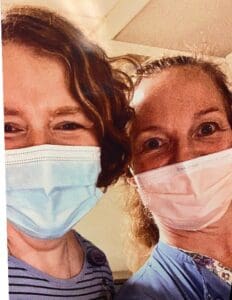
Colleen Henwood (left) and Liz Brock (right)
“I went from being the baby nurse to one of the senior nurses, the roles have shifted a lot from 30 years ago but it’s still similar to what I was going through and what the new nurses are going through now — navigating their first job out of nursing school, feeling disillusioned by healthcare in general, the sadness that nursing is not always rewarding and it’s emotionally taxing and exhausting,” says Brock. “That is why we celebrate our travels, buying new homes, having babies and all the positive things in life.”
With peer support and a drive to serve patients, their families, and each other, Brock knows that they can get through with strong bonds and connections.
Photo caption: Liz Brock (second from left) and colleagues on 8N.
